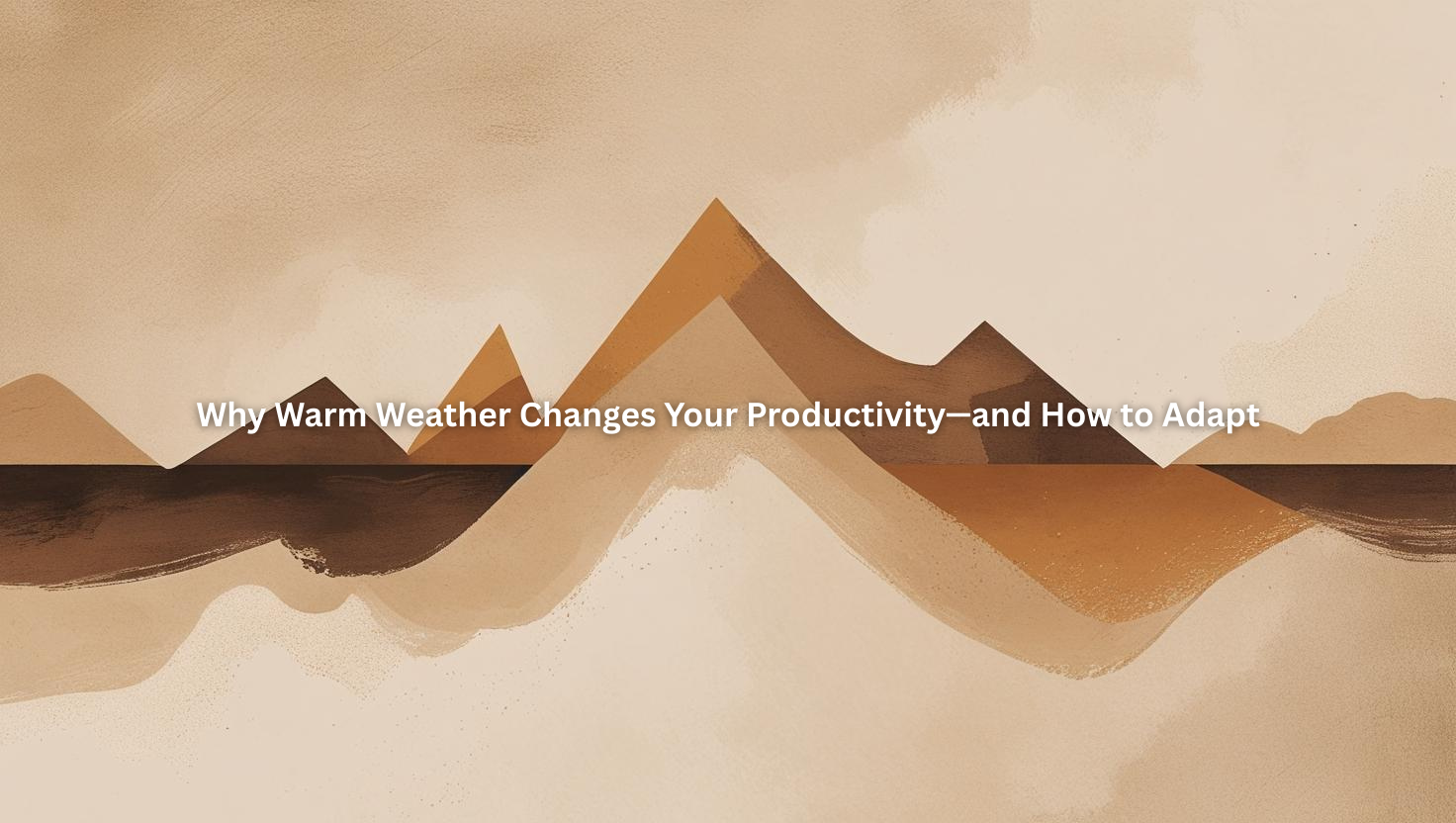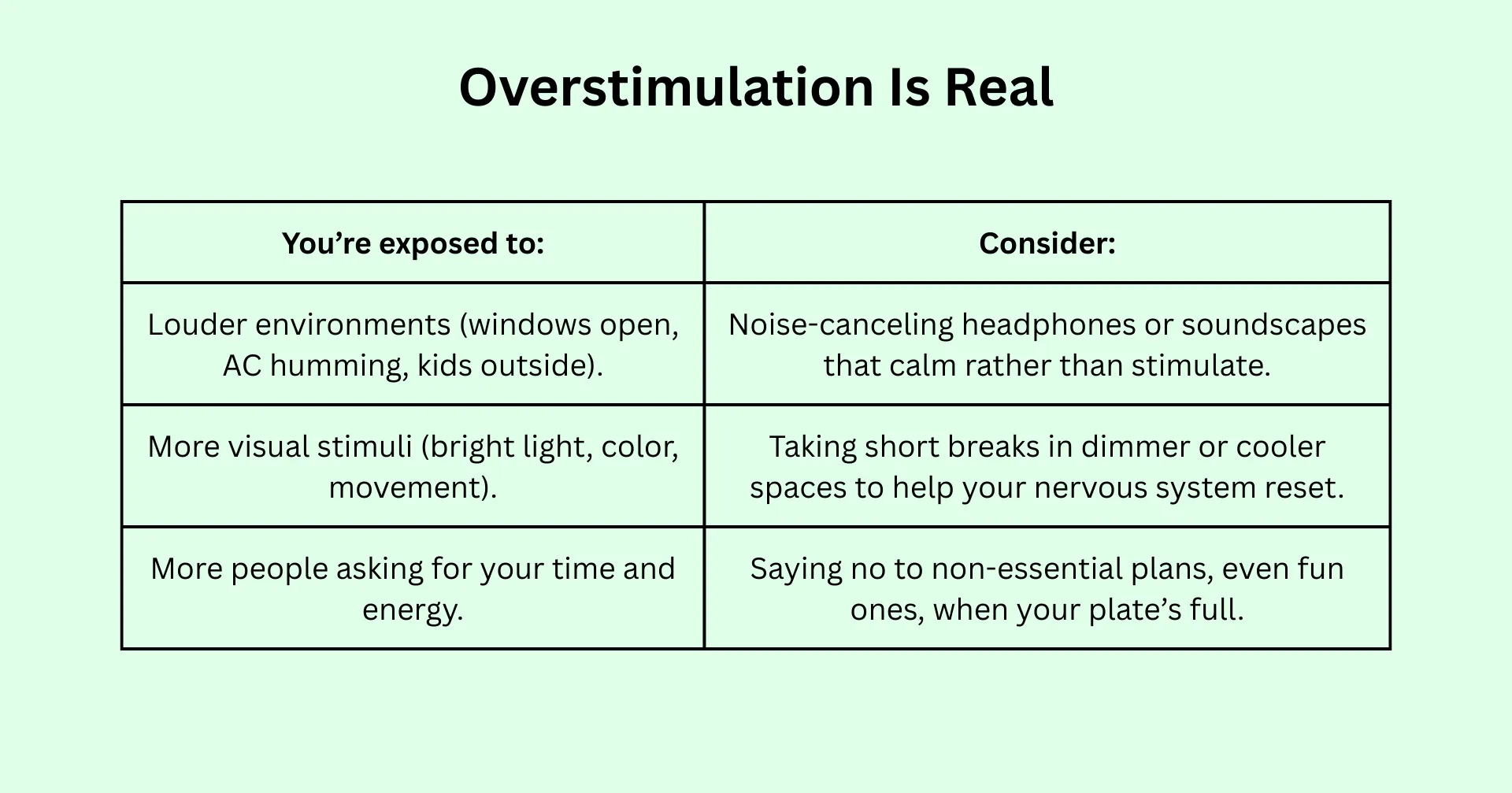The science of summer slumps, and what to do instead of powering through.
The sun’s out, your calendar’s packed, and suddenly… every task feels like wading through molasses.
If you’ve ever wondered why summer makes you feel scattered, sleepy, or straight-up uninterested in your work, it’s not just vacation brain. Warmer temperatures really do impact how your body and brain function—from your attention span to your motivation levels.
But here’s the good news: you don’t have to power through the heat or wait for September to get back on track. You just need to work with your energy, not against it.
Let’s unpack how warm weather changes your productivity—and how to adapt with more ease, clarity, and flow.

Your Body Is Doing More Than You Think
When it’s hot out, your body uses extra energy to regulate your core temperature. That means more energy spent cooling down = less energy for focus, motivation, or decision-making. It’s not that you’re lazy—it’s that your biology is rerouting resources.
You might notice:
- Afternoon crashes hitting earlier and harder.
- Brain fog during high heat or humidity.
- A general sense of blah when it comes to deep thinking.
Understanding this isn’t an excuse—it’s a way to work smarter with your seasonal rhythms.
Circadian Rhythms Shift in Summer
Longer daylight hours can shift your internal clock, often pushing your natural peak energy times earlier in the day. You may feel sharper in the mornings and slower in the late afternoon—even if you’re not a “morning person” the rest of the year.
Try adapting your schedule by:
- Tackling complex or creative work earlier, while your brain’s fresher.
- Saving admin, emails, or low-focus tasks for hotter hours.
- Building in a midday reset (more on that below).
You don’t have to overhaul your routine—just tilt it to match your energy curve.
Overstimulation Is Real
Warm weather usually brings more noise, more social plans, and more sensory input overall. You’re exposed to:
- Louder environments (windows open, AC humming, kids outside).
- More visual stimuli (bright light, color, movement).
- More people asking for your time and energy.
This can lead to sensory overload and faster burnout, especially for neurodivergent folks or anyone sensitive to their surroundings.
Consider:
- Noise-canceling headphones or soundscapes that calm rather than stimulate.
- Taking short breaks in dimmer or cooler spaces to help your nervous system reset.
- Saying no to non-essential plans, even fun ones, when your plate’s full.

You Don’t Have to Be On All the Time
There’s a weird pressure in summer to do more, be more, say yes to everything—sunsets! happy hours! weekend trips!—while still performing at work. That pressure creates a constant tug-of-war between rest and responsibility.
But summer can actually be a perfect time to scale back and reset. Ask yourself:
- What projects can be paused or simplified?
- What rhythms feel more nourishing than productive right now?
- How can I shift my expectations without guilt?
Sometimes the most productive thing you can do is slow down with intention, so you can return sharper later.
Build a Summer-Specific Workflow
Instead of trying to copy-paste your usual work routine into a new season, build a summer version. One that’s lighter, cooler, and kinder.
Here’s what that might look like:
- Start earlier, end earlier to take advantage of natural energy curves.
- Use soundscapes that match the season—think breezy ambient, soft instrumentals, or nature sounds.
- Batch your tasks so you can take longer midday breaks.
- Lower your input (less screen time, fewer tabs, gentler lighting).
This isn’t slacking. It’s strategic recalibration.
Final Thought: Summer Isn’t a Distraction—It’s a Signal
When the weather changes, your energy shifts with it. The mistake isn’t slowing down. It’s ignoring the signal your body is sending: You’re allowed to do things differently.
The goal isn’t to force productivity. It’s to design a rhythm that feels good enough to sustain you—even when it’s 90 degrees and you’d rather be at the pool.
So, what can you soften this season? What can you shift—not because you’re falling behind, but because you’re ready to feel aligned?

.png)

.avif)